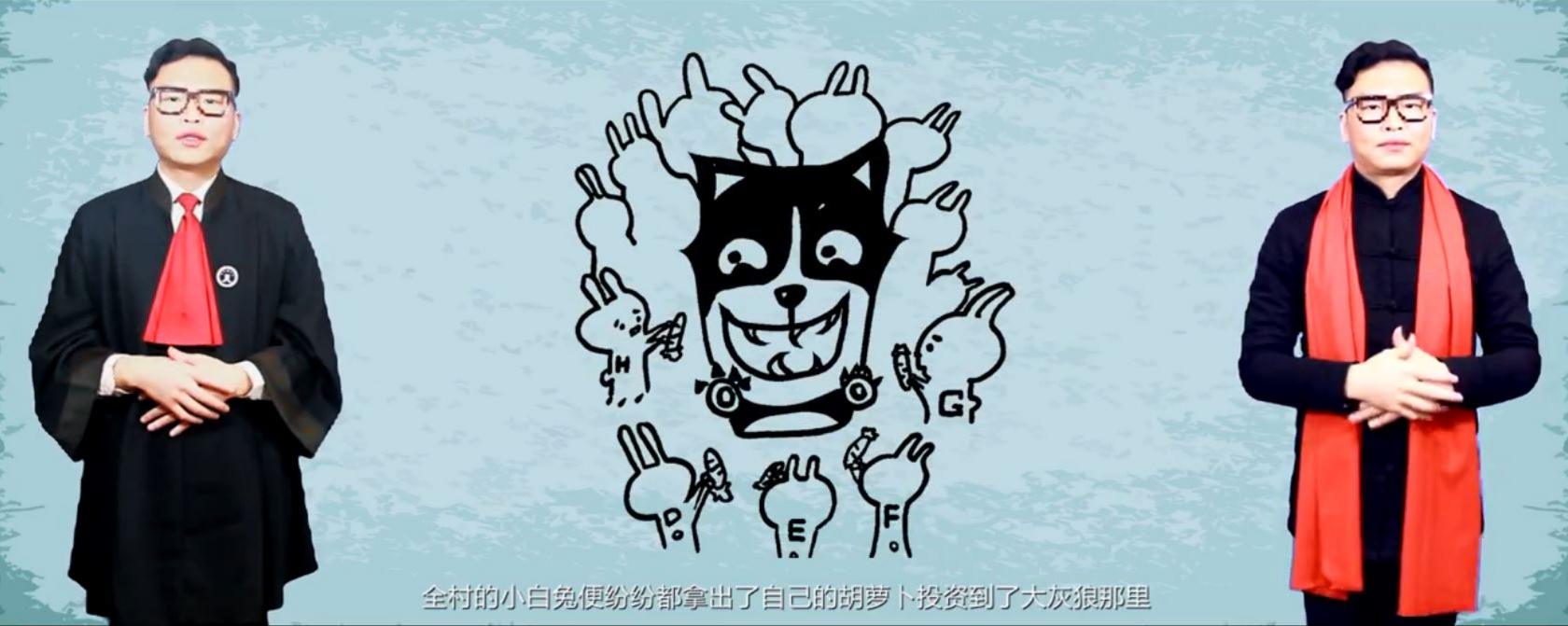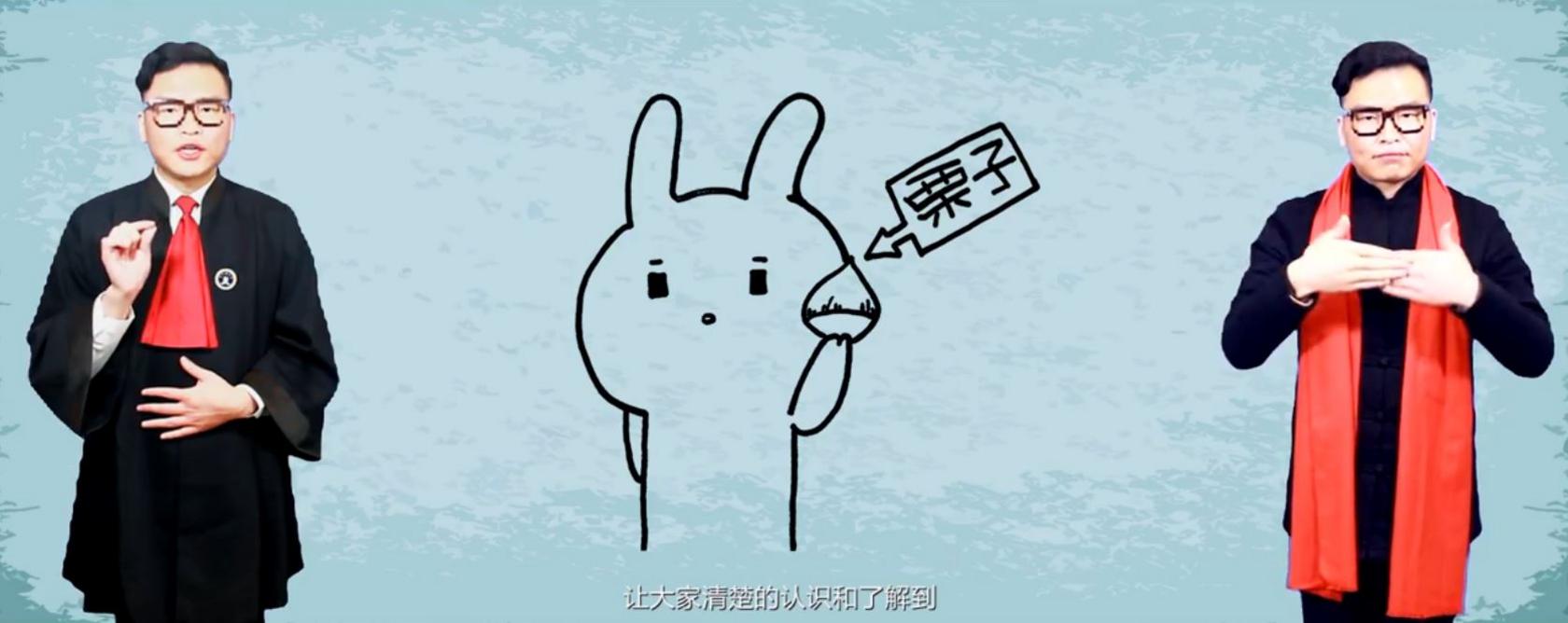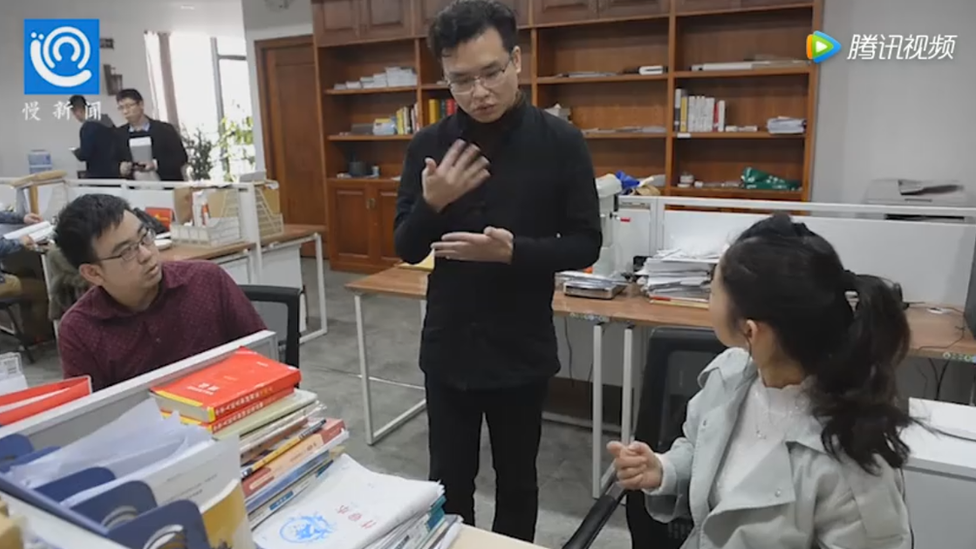The sign language lawyer who became a social media star
- Published

The video that energised the Chinese deaf community, featuring Tang Shuai
When a lawyer posted a video in sign language about the danger of Ponzi schemes, his post went viral and hundreds of deaf people got in touch with their legal troubles, from fraud to domestic violence. He had uncovered a huge community in need of help.
Tang Shuai was simply trying to improve legal knowledge among the deaf community when he posted the video on China's WeChat messaging app in February.
It was an instant hit. Mr Tang was flooded with so many friend requests that he had to ask WeChat to boost the friend limit from 5,000 to 10,000. So why did it strike such a chord?
The answer goes way beyond legal difficulties and into the complex world of sign language in China.
Language barriers
There are two types of sign language in the country. Chinese Sign Language (CSL) is taught in schools and used by most interpreters and instructors. It is the standardised version of the language, tied closely to the written language. But day-to-day, many deaf people also use natural sign language. The language has grown and evolved over time, and changes from region to region.
This has led to misunderstandings in courtrooms - and some dire consequences for deaf people - which Mr Tang is well placed to understand.
He was born to deaf parents in Chongqing in south-west China, and can understand both forms of sign language.
But he tells the BBC that his parents were initially hesitant about him learning.
"My parents didn't like me studying sign language at first," Mr Tang says. "I had no choice but to quietly sneak into my parents' factory, to learn with the deaf ladies and gentlemen there," explaining that many of the workers were deaf themselves.
He picked up more skills by visiting the popular Chaotianmen tourist area.
"Many deaf people from outside of the city come there. It was possible for me to learn many different versions of sign language," he says.
Lost in translation
Before becoming a lawyer, Mr Tang worked for six years as a sign language interpreter in Chinese courts. He studied law after realising many deaf people knew little about their legal rights.

A group of deaf prisoners watching sign language interpreters at a courtroom in China
He tells of one notable case, where he defended a man suspected of theft.
"When I went to the city detention centre to meet [my client] I used natural sign language. He was surprised to see that I could communicate with him...then he told me, 'I can't understand much of the sign language used by the [police] interpreters'."
Mr Tang said additional sign language lawyers were brought in to assess mistakes in the translation of evidence given earlier in the case, and the court ruled his client was innocent of one of the original charges.
After the case, the judge told Mr Tang the case highlighted the "many problems, where deaf people are involved, in the translation of sign language."

You might also like:

Defending the voiceless
Mr Tang wanted to do more to help the deaf community.
Despite a significant expansion in access to education, some deaf Chinese are still targeted by financial scam organisers. Stories of deaf people who lost fortunes in scams prompted Mr Tang to launch the video series that shot him to social media fame.

Tang Shaui uses sign language and animations to explain what a Ponzi scheme is
Financial scams are thriving in many parts of China as organisers target vulnerable communities with the promise of employment or lucrative returns for direct sales.
Victims are promised rewards if they recruit more investors into the operation. The schemes operate by attracting new investors, with some of the funds paid back to early joiners. Experts say the Chinese schemes are different to Western versions due to the lack of sophistication of the investors involved.
Mr Tang outlined the pitfalls of Ponzi schemes by telling the story of a wolf that cheats rabbits by promising to give them high returns on their investments - for every 10 carrots they invested each month, he would give them four carrots as profit. When word got out, more rabbits would give their carrots to the wolf but in the end, the wolf conned them all by running away with their carrots.
Mr Tang's video was praised not only by deaf people in China, but netizens and even the national media. He became an online celebrity almost overnight, with many outlets dubbing him the spokesperson for "those in the world that are voiceless".

Tang Jihui, a deaf client, says: "Lawyer Tang is our legal spokesperson"
Now he uses his expertise to promote legal awareness among the deaf community, alongside his full-time job as a lawyer. He set up a public WeChat account for his video series to provide education on key legal issues. He also set up a legal welfare service to give face-to-face consultations using video calls.
After being inundated with requests for legal assistance - and because of the lack of signing lawyers in China - he started training sessions for deaf people who want to forge a career in law. According to media reports, Mr Tang has hired five deaf graduates from a local university and is training them to provide legal guidance to deaf people.

Mr Tang employs deaf graduates who can provide legal guidance to deaf people via video link
Deaf people aren't the only ones empowered by his videos. Mr Tang has inspired thousands of hearing people, with many saying they now want to learn sign language.
"I hope that sign language can be as important as a foreign language in our national education system," one Weibo user says.
- Published21 October 2017

- Published3 May 2018

- Published12 May 2016
